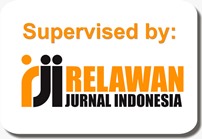META-ANALYSIS STUDY: THEORY OF PLANNED BEHAVIOR IN FRAUD BEHAVIOR
Abstract
As the world agenda in sustainable development, the Sustainable Development Goals (SDGs) have 17 programs that must be achieved by 2030. To achieve these goals, the four pillars of SDGs development the social, economic, environmental, legal, and governance pillars must be integrated. However, the phenomenon of fraud is a serious threat to the posts of law and governance that has the potential to hinder the achievement of goals. The previous research focused to develop the internal control system to reduce fraud, even though individual tendencies to commit fraud have an important role. Therefore, this study is intended to examine individual factors that influence fraud using the theory of planned behavior. Ten of the 53 selected studies were tested through meta-analysis according to the feasibility criteria, the results were attitude toward behavior, and perceived behavioral control had a significant effect on fraud behavior. The highest correlation is in the subjective norm variable, then the attitude toward behavior variable, and the lowest is the perceived behavioral control variable.
Full Text:
PDFReferences
Achmad, T. Fraudulent Financial Reporting And Whistleblowing System: Applying Theory Of Planned Behavior. Scientific Committee, 15.
Ajzen, I., & Dasgupta, N. (2015). Explicit and implicit beliefs, attitudes, and intentions. The sense of agency, 115.
Ajzen, I. (2020). The theory of planned behavior: Frequently asked questions. Human Behavior and Emerging Technologies, 2(4), 314-324.
Amrullah, M. M., & Novianti, N. (2017). Implementasi Theory of Planned Behavior dalam Mendeteksi Minat dan Perilaku Fraud pada Sektor Publik (Studi pada Bagian Keuangan di SKPD se-Kota Probolinggo). Jurnal Ilmiah Mahasiswa FEB, 5(2).
Association of Certified Fraud Examiners. (2022). Occupational Fraud 2022: A Report to the nations. ACFE.
Barr-Pulliam, D. (2017). The relationship between internal audit assurance frequency and earnings manipulation intent and behavior: A theory of planned behavior approach. Available at SSRN 3093735.
Black, E. L., Burton, F. G., & Cieslewicz, J. K. (2022). Improving ethics: Extending the Theory of Planned Behavior to include moral disengagement. Journal of Business Ethics, 1-34.
Card, N. A. (2012). Applied meta-analysis for social science research. New York, NY: Guilford Press.
Carpenter, T. D., & Reimers, J. L. (2005). Unethical and fraudulent financial reporting: Applying the theory of planned behavior. Journal of business ethics, 60, 115-129.
Carrington, M. J., Neville, B. A., & Whitwell, G. J. (2010). Why ethical consumers don’t walk their talk: Towards a framework for understanding the gap between the ethical purchase intentions and actual buying behaviour of ethically minded consumers. Journal of business ethics, 97, 139-158.
Cohen, J., Ding, Y., Lesage, C. et al. Corporate Fraud and Managers’ Behavior: Evidence from the Press. J Bus Ethics 95 (Suppl 2), 271–315 (2010). https://doi.org/10.1007/s10551-011-0857-2
Cooper, R., Kuh, D., Hardy, R., & Mortality Review Group. (2010). Objectively measured physical capability levels and mortality: systematic review and meta-analysis. Bmj, 341.
Cressey, D. R. (1953). Other people's money; a study of the social psychology of embezzlement.
Dian, N. E. Z. (2021). The effect of Planned Behavior Theory on Corruption Intention Intracampus Organization. Jurnal RAP (Riset Aktual Psikologi Universitas Negeri Padang), 11(2), 150-167.
Glass, G.V. (1976) “Primary, Secondary, and Meta-Analysis of Research”,Review of research in Education, http://www. blackwellpublishing.com /medicine/bmj/systreviews/)
Guritno, D. C., & Mangkunegara. (2020). Korupsi dan SDGs: Perspektif Ekonomi Kelembagaan.
Hermanuya, S. A. (2020). Penerapan Kombinasi Theory Of Planned Behavior Dengan Fraud Triangle Terhadap Perilaku Bidan Desa Dalam Penatalaksanaan Pencatatan Dan Pelaporan Imunisasi Rutin Di Kabupaten Sampang (Doctoral dissertation, Universitas Airlangga).
Holtfreter, K., Reisig, M. D., & Pratt, T. C. (2008). Low self‐control, routine activities, and fraud victimization. Criminology, 46(1), 189-220.
Hope, K. R. (2020). Corruption reduction as a target of the sustainable development goals: Applying indicators and policy frameworks. In The emerald handbook of crime, justice and sustainable development (pp. 105-130). Emerald Publishing Limited.
Lin, B., Huang, J., Liao, Y., Liu, S., & Zhou, H. (2022). Why do employees commit fraud? Theory, measurement, and validation. Frontiers in psychology.
Moher, D., Shamseer, L., Clarke, M., Ghersi, D., Liberati, A., Petticrew, M., ... & Stewart, L. A. (2015). Preferred reporting items for systematic review and meta-analysis protocols (PRISMA-P) 2015 statement. Systematic reviews, 4(1), 1-9.
Nadhim, M. (2017). Analisis Minat Staff Keuangan Melakukan Fraud: Pendekatan Theory Of Planned Behavior Dan Fraud Triangle Theory (Doctoral dissertation, Universitas Brawijaya).
Othman, N., Mohamad, A. M., & Ismail, N. (2018). Predicting Factors Affecting Muslims' Family Takaful Participation: Theory of Planned Behaviour. Global Business and Management Research, 10(3), 1054.
Putra, K. N., Triyuwono, I., & Purwanti, L. (2018). Fraud procurement of goods and services a perspective of the Theory of Planned Behavior. Jurnal Akuntansi, 22(3), 385-404.
Sarikhani, M., & Ebrahimi, F. (2022). Whistleblowing by accountants: an integration of the fraud pentagon and the extended theory of planned behavior. Meditari Accountancy Research, 30(6), 1740-1763.
Škapa, R. (2013). Application of the theory of planned behavior to fraudulent returning. Acta Universitatis Agriculturae et Silviculturae Mendelianae Brunensis, 60(7), 379-386.
Timofeyev, Y. (2015). Analysis of predictors of organizational losses due to occupational corruption. International Business Review, 24(4), 630-641.
Transparency International Indonesia. (2023). Indeks Persepsi Korupsi Indonesia 2022. Diakses pada 3 Juni 2023, dari https://ti.or.id/indeks-persepsi-korupsi-indonesia-2022-mengalami-penurunan-terburuk-sepanjang-sejarah-reformasi/
Wang, C., Zhang, J., Yu, P., & Hu, H. (2018). The theory of planned behavior as a model for understanding tourists’ responsible environmental behaviors: The moderating role of environmental interpretations. Journal of Cleaner Production, 194, 425-434.
Yuniarwati, Y., Ardana, I. C., & Dewi, S. P. (2022, April). Theory of Planned Behavior for Predicting Fraudulent Financial Reporting Intentions. In 3rd Tarumanagara International Conference on the Applications of Social Sciences and Humanities (TICASH 2021) (pp. 529-537). Atlantis Press.
DOI: https://doi.org/10.31846/jae.v11i3.661
Refbacks
- There are currently no refbacks.

This work is licensed under a Creative Commons Attribution-NonCommercial-NoDerivatives 4.0 International License.
e-Jurnal Apresiasi Ekonnomi Indexed by:












